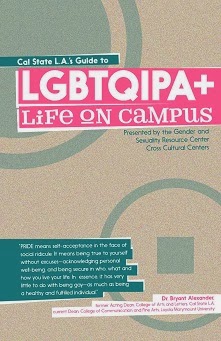Whittier College opened a multi-stall gender neutral restroom over a year ago… and the world did not end. Below is the campus-wide message regarding the facility.
Tuesday, September 11, 2012
Dear College Community,
You may have noticed that two additional gender-neutral bathrooms have been added on campus. One is behind Club 88 and the other is in the Science building.
This is the result of an important discussion last summer aimed at supporting individuals on campus (and guests) who identify as transgender and/or gender non-conforming. In addition, we want to accommodate people who have families or require assistance due to a temporary or permanent disability.
The big question: Why is this necessary?
Transgender people often experience significant anxiety and are subject to harassment and violence when using male- or female-specific campus restrooms. “Gender-neutral” bathrooms—typically single-stall, lockable restrooms available to people of all genders—provide a safe facility for transgender people by not requiring individuals to “choose” a gender based on how they identify or physical presentation. These restrooms also help families with children (such as mothers bringing sons, or fathers bringing daughters, to a restroom) and people with disabilities who need the assistance of an attendant of a different gender. Single-stall restrooms also more easily meet the accessibility regulations of the Americans with Disabilities Act (ADA).1
Context
Up until now, the only gender-neutral bathroom available was in Mendenhall. This means that parents with small children, people requiring assistance, and transgender and/or gender non-conforming individuals had few restroom options.
We understand that most gender-neutral bathrooms are single-stall, as described previously. Therefore, the facility by Club 88 is not a “traditional” gender-neutral bathroom because it includes more than one stall. However, it became more important to accommodate our community members than worry about whether or not we had a traditional facility. As with all gender-neutral bathrooms, they can be locked for privacy.
Adding gender-neutral facilities to our campus not only provides safety for our community; it honors the diversity of community members and promotes an inclusive environment.
For those who wish to use gender-specific restrooms, there are plenty on campus. In the campus center alone, there are three: downstairs by the Cultural Center and LEAP, upstairs by The Spot, and in Villalobos Hall. While it may feel inconvenient to walk to these facilities if you are accustomed to using the women’s restroom in Club 88, please consider that before now, we had individuals on campus who had to walk all the way over to Mendenhall. Now they have options too.
In addition, the gender-neutral bathroom is not suddenly unavailable to women. If you are comfortable using it, knowing that various individuals may use it as well, go for it! No one will stop you from doing your business. If you want/need privacy, simply lock the door. However, if you would rather use a gender-specific bathroom, they are available in other campus center locations.
If you have further questions, please contact me directly.
Thank you.
Joy L. Hoffman, Ed.D.
__________________________________________
Director of the Cultural Center
Whittier College ¡ Campus Center, 7214 Painter Avenue, Whittier, CA 90602
Phone: (562) 907-4963





